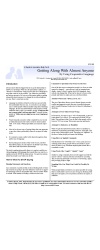The Power of Language
Our brains have evolved to have incredible facility to use language, and make sense of both behavior and the communication of other people.
For example, read the following:
Arocdnicg to rsceearch at Cmabrigde Uinervtisy, it deosn’t mttaer in waht oredr the ltteers in a wrod are, the olny iprmoatnt tihng is taht the frist and lsat ltteer are in the rghit pcale. The rset can be a toatl mses and you can sitll raed it wouthit pobelrm. Tihs is buseace the huamn mnid deos not raed ervey lteter by istlef, but the wrod as a wlohe.
Most of us can, indeed, make good sense from this despite the fact that many of the words aren’t words at all. The same is true of sentences that are not grammatical. Even severely mangled sentences can usually be deciphered, at least well enough to get a general drift of what the person is trying to say.
Not only that but we can make sense from sentences that contain words for which we lack definitions — words we may not have ever heard before. We might not be able to give a dictionary definition, but after coming across an unknown word in a few different contexts, we can generate good guesses at the word’s meaning, while being able to understand the sentences pretty well.
It’s all pretty amazing, and one way we are able to do these things is the use of the context in which the communication occurs. It’s easy to forget that the environment, and what else is going on at the same time, PLUS experience with specific people, often give us more “meaning” about what’s being said than either the words, or even the tone of voice.
…But With Our Power, Comes Peril
Today a man walked into a reception area, and the receptionist greeted him with a hearty and cheery good morning. The man replied: “No, it’s not.”
Everyone in that room knew (or thought he knew) exactly why the man said what he said, and if you asked us to tell you privately what we thought was going on, you’d have almost certainly heard similar stories from all the observers, and, of course, the receptionist.
How could we know, or think we knew with almost virtual certainty? How could three simple words that could be uttered anywhere on the planet about anything on the planet tell us enough to be so certain?
It was a dentist’s office. Even if you weren’t there, you could easily and quickly construct a story that would be pretty accurate. The fellow was there because he had a problem with his teeth. He was experiencing pain, and also knew it would cost a bundle to fix. And the solution was probably going to be painful in and of itself. So, for him, it wasn’t a good morning.
It’s our human ability to interpret what is said within the context of where it’s said and what else is going on.
If the same scenario happened at a car mechanic’s shop, the story would be quite different. In a doctor’s office, pretty easy to guess, and we’d likely rule out some things — for example, a diagnosis of a terminal illness, because it would be unlikely someone just receiving that type of bad news would respond that way. We already KNOW these things, and to look to context.
The Peril of Context
The peril lies in getting things wrong, and we tend to make certain kinds of errors about context, when interpreting language.
We almost always are limited to our own experience when combining context with what someone has said. We “believe” that because we see things a certain way — in this case that the dentist’s office is a place that may be short term unpleasant, and a place where people go when in pain, that we can become unable to see that people differ in what a context means to THEM. When their experience is different than ours, we make errors.
For example, imagine two Vegans discussing the horrors of a steak, with one saying, “Ah, such a succulent bloody treat”. If both are aware of each other’s “vegan-ism” the communication works, because they share a context.
The same sentence, said from one meat lover to another, in a steakhouse, would be taken entirely differently, but again, both parties would get the meaning correctly. Again, they share a context.
BUT, if two strangers, one Vegan, and one meat eater, happen to meet, and the Vegan says to “Ah, such a succulent bloody treat”, the meat eater will miss the sarcasm intended, if, and because he will use his own context. Change the location for the conversation to a steak house where no Vegan meals are served, and it’s almost guaranteed that the meat eater will believe the Vegan is looking forward to a steak cooked only slightly. Which would be wrong.
So, while context interpretation allows us to make sense of all kinds of garbled communication, the danger is that we won’t be aware that the contexts for two people are different. Or that some pieces of the contexts aren’t available to us, then there are problems. If our dentist visitor was wearing a delivery person’s uniform, and entered with an arm hanging crookedly, we might come up with a different explanation — perhaps of a car accident.
Conclusion
The solution of course, is to check for understanding, but there’s a catch with that also, because if we checked for everything, we’d never get any real conversations going. We’d get bogged down in detail. In most conversation, particularly if we are chit-chatting for social reasons, it doesn’t matter, but for important communication, where it’s critical that the parties share a common understanding, then you must check for it.
Bonus question: Can you see why Twitter is an exceedingly poor means of communicating? It’s because the context (or the conversation history) is often absent.






